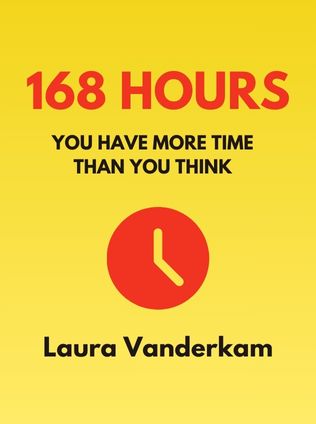
168 Hours
You Have More Time Than You Think
By Laura Vanderkam
Published 05/2010
About the Author
Laura Vanderkam is a prominent voice in the realm of productivity and time management. With a career devoted to understanding how people can better allocate their time to lead fulfilling lives, Vanderkam has authored several books, each shedding light on different aspects of productivity. "168 Hours: You Have More Time Than You Think" is perhaps her most celebrated work, which challenges readers to rethink how they use their time and encourages a more intentional approach to daily life.
Vanderkam’s insights are backed by extensive research, interviews with successful people, and her own personal experiences. Her writing style is accessible yet profound, offering readers practical advice that is both actionable and inspiring. Over the years, Vanderkam's work has been featured in numerous prestigious outlets, including The New York Times, The Wall Street Journal, and Forbes. Her influence extends beyond her books, as she regularly speaks at conferences, appears on podcasts, and contributes to discussions on productivity and time management across various platforms.
What sets Vanderkam apart is her belief that time management is not about fitting more into your day but about focusing on what truly matters. She advocates for a shift in perspective—from feeling overwhelmed by time to recognizing the abundance of hours we have each week. This philosophy is at the core of "168 Hours," where she encourages readers to take control of their time and, by extension, their lives.
Main Idea
The central thesis of "168 Hours" is that everyone has the same 168 hours each week, but how we use those hours determines the quality of our lives. Vanderkam argues that most people feel overwhelmed by time because they are not intentional about how they spend it. Instead of letting time slip away on unimportant tasks, Vanderkam suggests that we should focus on our core competencies—the things we do best and that bring us the most satisfaction—and design our lives around these strengths.
Vanderkam introduces the concept of time tracking as a foundational tool for better time management. By meticulously recording how we spend our time, we can identify patterns and make informed decisions about how to reallocate our hours. She emphasizes that the goal is not to do more but to do more of what matters. This approach allows for a balanced life where work, family, and leisure can coexist harmoniously, without the constant feeling of being rushed or stressed.
Throughout the book, Vanderkam dispels common myths about time, such as the idea that we are too busy to pursue our passions or that work-life balance is unattainable. She provides readers with practical strategies for reclaiming their time and offers a new perspective on what it means to live a full and satisfying life.
Table of Contents
- Introduction
- The Key to Productivity: Being Intentional With Your Time
- How to Be Intentional With Your Time
- Why and How to Be Intentional at Work
- Why and How to Be Intentional at Home
- Why and How to Be Intentional With Your Leisure
- Conclusion
The Key to Productivity: Being Intentional With Your Time
Vanderkam begins her exploration of time management by emphasizing the importance of being intentional with your time. She introduces the concept by comparing two fictional characters, Lisa and Mary, who represent different approaches to time management. Lisa is highly productive, managing to balance a demanding job, family responsibilities, and personal hobbies, while Mary struggles to get through her day, often feeling overwhelmed and unaccomplished. The key difference between the two? Lisa is intentional about how she spends her time, while Mary is not.
This idea of intentionality is central to Vanderkam's philosophy. She argues that being productive is not about having more time but about making better choices with the time you have. To achieve this, Vanderkam outlines three critical practices:
Sign up for FREE and get access to 1,400+ books summaries.
You May Also Like
The Subtle Art of Not Giving a F*ck
A Counterintuitive Approach to Living a Good Life
By Mark MansonRich Dad Poor Dad
What the Rich Teach Their Kids About Money - That the Poor and Middle Class Do Not!
By Robert T. KiyosakiHow To Win Friends and Influence People
The All-Time Classic Manual Of People Skills
By Dale CarnegieQuiet: The Power of Introverts
The Power of Introverts in a World That Can't Stop Talking
By Susan Cain



















